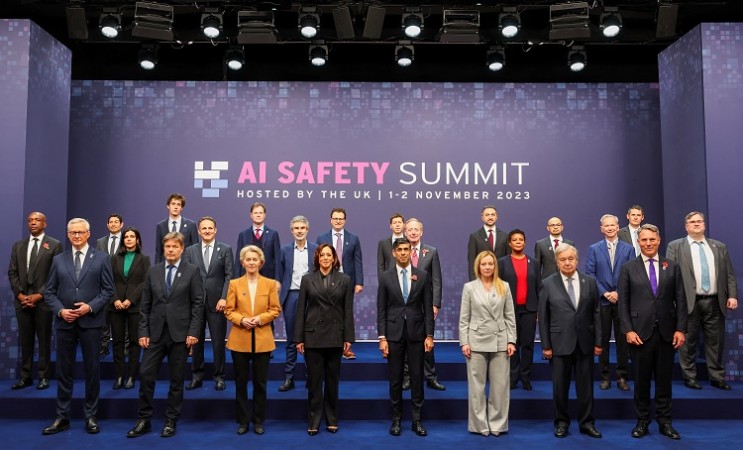
London: British Prime Minister Rishi Sunak has heralded a series of groundbreaking agreements following the inaugural Artificial Intelligence (AI) Safety Summit, but the prospect of a comprehensive international framework for overseeing AI technology appears to be a distant aspiration.
During two days of deliberations, world leaders, corporate executives, and researchers convened to discuss the future regulation of AI. Tech titans, including Elon Musk and OpenAI's Sam Altman, shared the stage with high-profile figures like US Vice President Kamala Harris and European Commission chief Ursula von der Leyen.
Representatives from 28 nations, including China, affixed their signatures to the Bletchley Declaration, an accord recognizing the inherent risks associated with AI. The United States and the United Kingdom each revealed plans to establish their own AI safety institutes, and two additional summits were slated for South Korea and France in the coming year.
While a degree of consensus was reached regarding the imperative for AI regulation, stark disagreements persist concerning the specifics of such regulations and who should spearhead these endeavors.
The risks stemming from the swift evolution of AI technology have increasingly occupied the agendas of policymakers, particularly since the public release of ChatGPT, a Microsoft-backed OpenAI chatbot, last year. The chatbot's remarkable capacity to engage in human-like conversations has prompted experts to urge a pause in the development of such systems, fearing that they may gain autonomy and pose threats to humanity.
Sunak expressed his "privilege and excitement" in hosting Tesla's Musk, but European lawmakers voiced concerns over excessive technology and data concentration in the hands of a few companies within the United States.
French Minister of the Economy and Finance Bruno Le Maire emphasized the importance of avoiding a scenario where one country possesses all the technologies, private enterprises, devices, and expertise, declaring, "Having just one single country with all of the technologies, all of the private companies, all the devices, all the skills, will be a failure for all of us."
The United Kingdom diverged from the European Union by advocating a light-touch approach to AI regulation, in contrast to the EU's nearing completion of the AI Act, which will impose stricter controls on developers of what are considered "high-risk" applications.
Vera Jourova, Vice President of the European Commission, came to promote the AI Act and emphasized the necessity for some form of global agreement on regulations, stating, "If the democratic world will not be rule-makers, and we become rule-takers, the battle will be lost."
Although the summit projected an image of unity, attendees noted that the three dominant power blocs—the US, the EU, and China—each sought to assert their influence.
Some argued that US Vice President Kamala Harris outshone Prime Minister Sunak when the US government unveiled its AI safety institute, just a week after Britain's announcement, and she emphasized the technology's short-term risks, diverging from the summit's central focus on existential threats.
The presence of China at the summit and its endorsement of the "Bletchley Declaration" were hailed as a success by British officials. China's vice minister of science and technology expressed the country's willingness to collaborate with all parties on AI governance. However, there were underlying tensions between China and the West, as Wu Zhaohui pointed out, "Countries regardless of their size and scale have equal rights to develop and use AI."
A recurring theme in the confidential discussions, as highlighted by several participants, was the potential risks associated with open-source AI, which grants the public unrestricted access to experiment with the technology's underlying code. Some experts have warned that open-source models could be exploited by malevolent actors for purposes such as creating chemical weapons or developing super-intelligence beyond human control.
During a live event in London, Musk spoke with Sunak, stating, "It will get to the point where you've got open-source AI that will start to approach human-level intelligence, or perhaps exceed it. I don't know quite what to do about it."
Yoshua Bengio, an AI pioneer tasked with leading a "state of the science" report commissioned under the Bletchley Declaration, emphasized the pressing need to address the risks associated with open-source AI. He noted, "It could be put in the hands of bad actors, and it could be modified for malicious purposes. You can't have the open-source release of these powerful systems and still protect the public with the right guardrails."